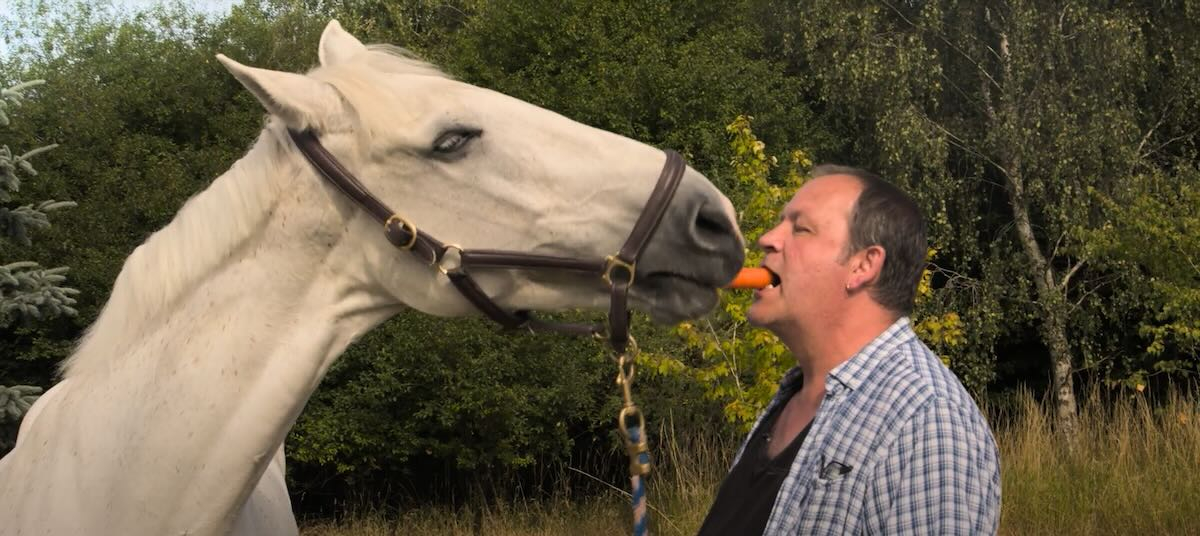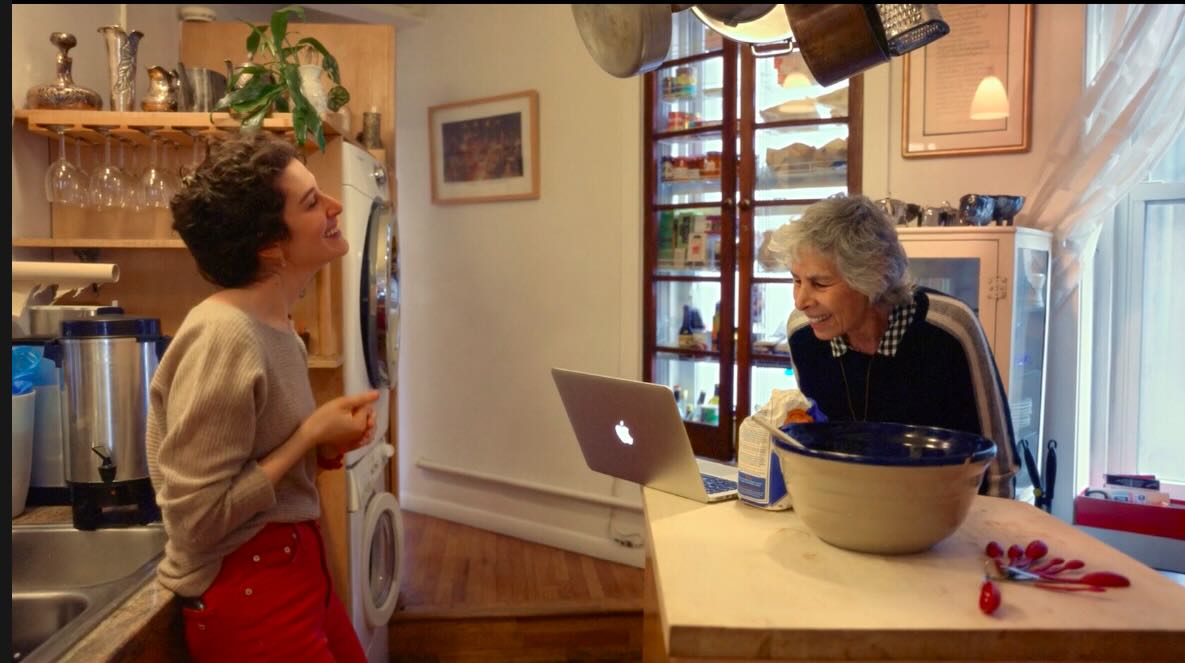My Jewish friends, students, relatives, and neighbors are a-quaking in their Crocs nowadays. Well, some of them are anyway. "Why?" you ask.
To be a Jew post-Oct. 7th certainly feels different than being a Jew pre-Oct. 7th.
When I lit my two menorahs last month and placed them on my living-room windowsills, my paranoia kicked in. What if the guy across the street owns a Kalashnikov rifle and doesn't like writers of Judaistic film reviews?
I was going to open this piece on the 33rd New York Jewish Film Festival at Lincoln Center with: "It's hard being a Jew nowadays," but upon double-checking, I saw I had kicked off last year's review with the same line.
"When was it ever easy?" you might ask.
"But in New York City?"
Nowadays, I wouldn't wear a Golda Meir T-shirt on the subway for all the tea in Williamsburg. A Sandra Bernhard T-shirt maybe.
So, how do you define a Jew in case you are anti-Semitic and don't want to accidentally hate the wrong person? It's getting harder, though not as difficult as defining queer sexuality. If you are a bigot, you might have an easier time picking on Mormons.
Yes, a person's Jewishness will become harder to designate in future decades. According to a 2020 Pew Research Center conducted in the States, "42% of all currently married Jewish respondents indicated they have a non-Jewish spouse. Among those who had married since 2010, 61% were intermarried, and the percent increased to 72% when Orthodox Jews were excluded from the data." No wonder mezuzah sales are plummeting.
In the future, Film at Lincoln Center might have to retitle this annual event, the "New-York-I-think-My-Great-Grandmother-Observed-Passover Film Festival."
"So what is a Jew?" I ask again, no doubt, to delay getting to the gist of this article: the reviews.
Ask Rabbi Joseph Telushkin, who noted in his classic Jewish Humor: What the Best Jewish Jokes Say About the Jews (1992) that "[w]hat makes Jews Jewish is a specific religious culture and historical experience that has shaped their values and strongly influenced how they view the world."
Well, my stepmother Gerda left me a 1940's photo of herself in Berlin sitting on a bench marked "For Jews Only." A month before he expired, my father Walter (pronounced "Vahl-tah") shared how he was once rounded up by the Nazis, and only through his boss's connections did he get to escape to the Big Apple. All of which caused me to have a longish affair in the 1990s with a German film director, who at one time was certain his biological father had been a Nazi. "Oy vey!" Could I be more Jewish? (Happily, two of his films eventually played at the New York Film Festival, and his pop turned out to be just a run-of-the-mill World War II German.)
Which leads us to the National Center for Jewish Film's restoration of the Yiddish feature Hayntige Mames, or as Gentiles like to call it, Mothers of Today. Starring 1930s radio star Esther Field, who was known as the Jewish Kate Smith before the airwaves deified her as the country's "Yiddishe Mama."
Mothers chronicles how two neighbors from the Old World feel a kick in the kishkes when their children are corrupted by the New World ways. What happened to the Fifth Commandment: Honor your mother and Father?
Forget it! Instead, there are jewel robberies, gunshots, kvetching, some terrific crooning (including of "Kol Nidre"), prison scenes, elopements, lots of tears and cooking, and the seduction of a cantor. Once heartbreaking, now far less so, Mothers is still a hoot of entertainment, capturing much of the mishigas many immigrants continue to face today after cruising past Lady Liberty,
Best of all is the beautifully delivered platitudes: "Children only realize their mistakes after they make them,"; "Man plans, God laughs," and the always useful "Love isn't a potato."
This kosher caprice, by the way, was directed by a Mr. Henry Lynn, of whom Variety's critic once wrote concerning another of his features: "The director's name is Henry Lynn. Maybe he's a Jew, and maybe he isn't. If he isn't, he doesn't belong at the helm of a Yiddish film. As a matter of fact, judging from his work here, he doesn't belong at the helm of any kind of film."

No one would say such a thing about either Adam Goott or Alex Szlezinger after viewing their four-minute documentary short "Shabbos Goy." Before we get to what a "Shabbos Goy" actually is, let it be known that the directors are former Cambridge students who, in 2017, at the age of 19, started a popular Facebook site, Your Jewish Dad Talk UK.EU, "a page exclusively reserved for the taking the piss out of nebbish Jewish dads." A photo of Mr. Eugene Levy appropriately greets all who enter the site.
So what is this job all about? According to the Seattle Times' Dion Nissenbaum, "[t]his irregular Shabbos Goy trade grew out of a unique need in Orthodox communities for non-Jewish help on the Sabbath. From sundown Friday to sundown Saturday, Jewish law calls on the observant to take a break from life. Cellphones are turned off. No one is allowed to drive. Meals must be cooked in advance. There's no TV. No computer. No shopping." So if a light needs to be switched off, or a fuse changed, or a hotplate needs plugging in, the Shabbos Goy steps in. (Please note that Elvis Presley and Barack Obama are among the Shabbos Goys of note if you are writing up a list.)
This charmingly wry short, though, while sharing that trivia, focuses instead on one Terry Neville, who sometimes sings to himself but has never run for office. A self-proclaimed "complete atheist," this gentle, slightly beefy soul, attired in a black tank top and jeans, has been serving as a caretaker at the Radlett United Synagogue for over a decade. "I do bits and bobs the Jewish people can't do," he explains.
Yes, he thoroughly enjoys his job, even though he's against circumcision. "Why do that?" he exclaims, after which he's shown knifing a carrot.
"Coming in seven days a week to work in a synagogue I would never ever thought would happen," Mr. Neville smilingly shares. "I don't know what it is, but I always ended up working with Jewish people. I talked to my family about my job, but I don't think they really understand."
With a bit of clever animation and shots of Mr. Neville eating a different carrot from opposite ends with Candy the Horse, this film is a perfect antidote to the lengthier offerings such as Oppenheimer and Killing of the Flower Moon that we've been repeatedly subjected to lately.

Also brief, clocking in at less than 12 minutes, is Sarah Rosen's "How to Make Challah," a feistily entertaining collage of two home movies: one shot in 1975 and the other in 2022.
Here are the women of the Rosen family trying to keep a Jewish family tradition alive, the Friday baking of challah, which started back in Lithuania. In the earlier footage, Sarah's Aunt Jane is filming her 97-year-old grandmother Ida (Sarah's great-grandma) in her kitchen. Forty-seven years later, Sara is shooting her Aunt Jane at the same task. Gleefully, for us, neither of the sardonic bakers is that joyful about their chores.
Immediately, Ida is kvetching while kneading: "The women of today, they want everything readymade. They want to bother for nothing. They wouldn't bother with baking anything. They think you're crazy!"
Jump ahead, and we're with Aunt Jane, who has never before been intimate with a challah in its early stages. She has only agreed to try her hand in the kitchen after her niece got a grant to make this short. "I am not a baker. Gar nicht. This is going to be immortalized, but I am not a baker. . . . If this turns into a challah, it'll be some type of miracle."
Well, miracles occur now and then. So yes, indeed, the challahs arise. And with the addition of some archival photos of neighborhoods long gone, a little chatter about the Triangle Shirtwaist Fire, plus shots of Aunt Jane's creative plant watering, the result is never less than pleasurable, making you want to be around for 47 more years to see Sarah's offspring shooting her in the kitchen.
Sadly, there's no Gene Wilder Jr. to carry on his family's tradition. Only a Dr. Frederick Frankenstein, a Willy Wonka, a Leo Bloom, and a Jim in Blazing Saddles (1974) to remember Gene Wilder by. Oh, and don't forget there's his film debut in Bonnie and Clyde (1967) and his infamous love affair with a sheep in Woody Allen's Everything You've Always Wanted to Know About Sex (But Were Afraid to Ask) (1972). But now, thanks to Ron Frank's disarmingly loveable documentary, Remembering Gene Wilder (to be released by Kino Lorber on March 15th), the actor appears so alive on the big screen that you can't believe he actually departed us in 2016.
Utilizing the star's audio-book reading of his autobiography as the film's narrative voice, Frank intercuts scenes from Wilder's classics with recollections from Mel Brooks, Carol Kane, Alan Alda, plus his relatives and friends. Then there's, of course, footage of his tragically short yet tinged-with-happiness marriage to Gilda Radner.
"Acting is so much easier than life," the man who started out as Jerome Silverman in Milwaukee insists, and who could argue with that?
Also showcased was the exemplary Hitler documentary, The Books He Didn't Burn, a look at how the printed word shaped or misshaped der Führer. James Hawes' tear-inducing Holocaust biopic, One Life, stars Anthony Hopkins in more than fine form as Sir Nicholas Winton, who, as a young man, spearheaded the rescue of over 600 Jewish children from Nazi-occupied Czechoslovakia, a venture forgotten for too many a decade.
Also not to be overlooked is Yuval Shapira's short, "The Speed of the Distance Between Us," a collection of interviews with parents of Israeli soldiers who have died in service over the years and the shrines of sorts they have set up for their sons and daughters in their homes. As one mother notes, "Today, I have learned to live with absence."
(The 33rd New York Jewish Film Festival began January 10th and ran until the 24th. This year, Film at Lincoln Center and the Jewish Museum presented 28 features, documentaries, and shorts examining Jewish life past and present as conceived by international filmmakers.)
